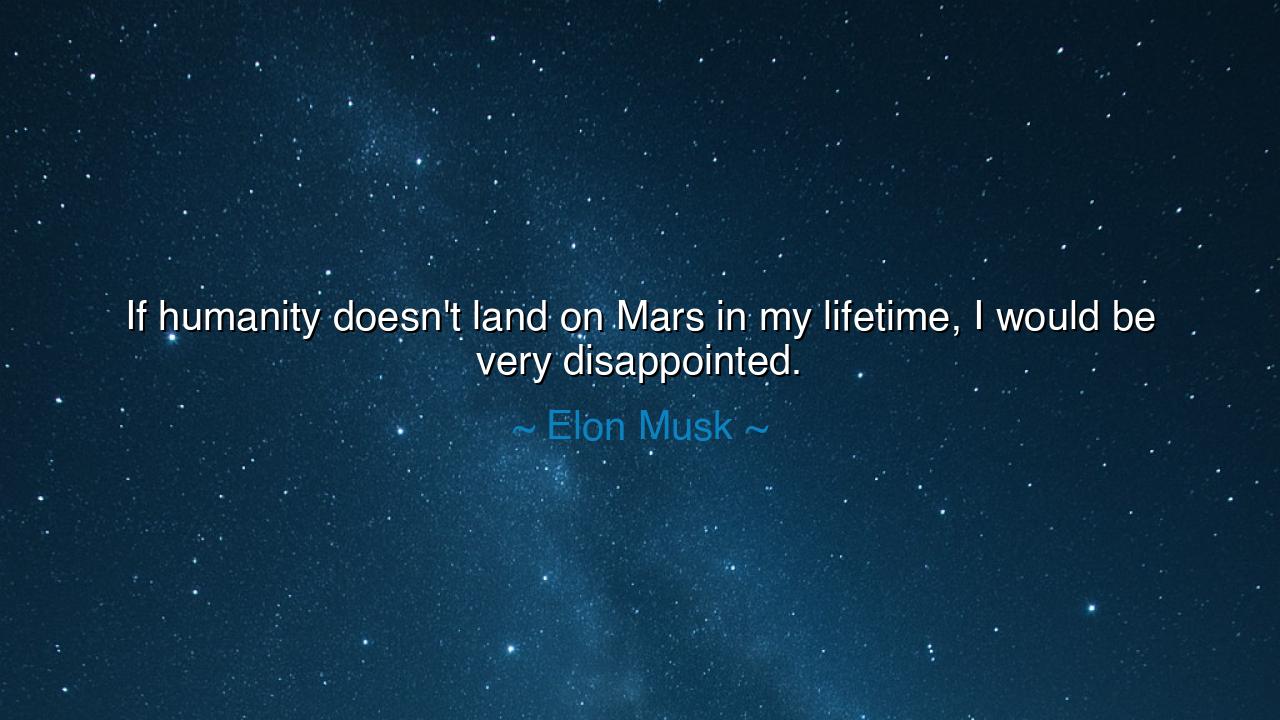
If humanity doesn't land on Mars in my lifetime, I would be very






"If humanity doesn't land on Mars in my lifetime, I would be very disappointed." These words, spoken by Elon Musk, embody a vision of human ambition, exploration, and the relentless pursuit of the unknown. Musk, a modern visionary and entrepreneur, speaks to the boundless potential of humanity, urging us to look beyond the limitations of our current existence and reach for the stars—literally. To him, Mars is not just another planet; it represents the next frontier for humanity, a place where we can expand our knowledge, our capabilities, and our very understanding of life itself. Musk’s statement is a call to action—a challenge for all of us to dream big, to stretch the boundaries of what we think is possible, and to pursue progress with unwavering determination.
In the ancient world, the idea of exploration and discovery was no less a driving force for humankind. The Greeks, with their fascination for the heavens, believed that the cosmos was a realm full of mysteries waiting to be uncovered. The great philosophers and scientists, such as Aristarchus of Samos, proposed that the Earth revolved around the sun, a theory that was heretical at the time but would later form the basis of modern astronomy. In their quest to understand the universe, the Greeks sought to push the boundaries of knowledge and to explore ideas that were once thought impossible. Just as Musk looks toward Mars, the ancient Greeks looked to the stars as a symbol of human potential and the infinite possibilities of discovery.
Similarly, the Romans were known for their expansive imperial ambitions, reaching across continents to build an empire unlike any before them. They, too, understood that the future belonged to those who dared to venture beyond their comfort zones and to expand their horizons. Julius Caesar, in his military campaigns, ventured into unknown territories, conquering and exploring lands beyond the Roman Empire. His leadership was driven by a vision of a greater world, much as Musk’s vision is driven by the possibility of expanding humanity’s reach beyond Earth. The Romans believed in the power of exploration—not just in the physical world but also in the intellectual and moral realms. Musk’s words echo the same imperial spirit: the desire to explore and extend the human experience into realms previously thought unattainable.
Musk’s statement also reflects a modern version of humanity’s unyielding desire to transcend limitations. The idea of landing on Mars is not just about exploring a distant planet, but about affirming that humanity is capable of remarkable feats. Consider the story of Christopher Columbus, whose discovery of the Americas, though controversial at the time, opened up an entire new world for exploration. Columbus’ journey was not one of certain success—it was fraught with danger, uncertainty, and doubt. Yet, his courage to embark on an unknown journey led to the discovery of new lands, and ultimately to the reshaping of history. Similarly, Musk’s drive to make space exploration a reality is rooted in his belief that we must be willing to face uncertainty and risk in order to achieve something that will forever change the course of human history.
In our current age, the quest to land on Mars is a pursuit of the unknown—a modern-day challenge akin to the expeditions of the ancients. Musk’s vision for a multi-planetary species is driven by the idea that humanity must push beyond its limits in order to survive and thrive. Just as the ancient explorers looked to the seas as a way to expand human knowledge, so too must we look to the stars as the next frontier. Musk’s commitment to SpaceX and the idea of colonizing Mars is an expression of human ambition at its most daring—a belief that the future of humanity lies not just in maintaining life on Earth, but in ensuring that we have the capacity to thrive beyond it.
The lesson we draw from Musk’s words is one of boldness and vision. Just as the ancient philosophers, explorers, and leaders were driven by a desire to reach beyond what was immediately achievable, so too must we as individuals and societies strive to dream beyond the present and embrace the challenges of the unknown. The journey to Mars, like the journeys of the past, is not guaranteed to succeed, but it is the act of reaching for the impossible that defines progress. Humanity’s greatest achievements have always come from those who dared to push boundaries, to question the status quo, and to risk failure in order to achieve the extraordinary.
In your own life, ask yourself: what are the limits you are willing to push beyond? What unknowns are you afraid to explore, and what bold visions can you chase in the pursuit of something greater? Mars may seem far away, but the future is full of possibilities waiting to be discovered. Just as Columbus sailed across uncharted waters and Musk dreams of humanity on another planet, you too can break free from your own limitations and explore new territories, whether they are in the physical world, in knowledge, or in the depths of your own potential. The future is waiting, and the path to greatness lies in daring to reach for it. Embrace the challenge, for it is only by embracing the unknown that we can truly shape the future.






AAdministratorAdministrator
Welcome, honored guests. Please leave a comment, we will respond soon